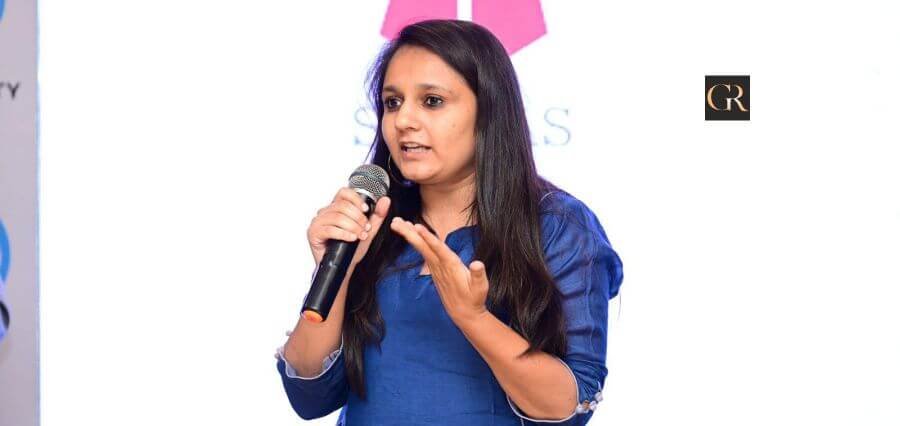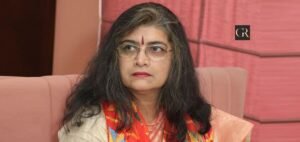In Gujarat’s bright tapestry of tomorrow, influential women are the master painters, adding vibrant brushstrokes of innovation, fearlessness, and kindness on each canvas.
Prominent leaders across different industries are not merely shattering glass ceilings-they’re constructing skylines, giving wings to dreams in boardrooms, classrooms, and communities. Their entrepreneurial zeal ignites revolutions in business, medicine, and education, while their compassion and intelligence harvest fields of empowerment and hope. Every move they make sows seeds of progress, making challenges into opportunities. With Gujarat’s rising sun, it shines brighter with their brilliance, illuminating a path where women lead, inspire, and shape the future.
Standing tall alongside these transformational forerunners is Kinjal Shah, the trustee and co-founder of Shwas Charitable Trust. Based in Ahmedabad, this NGO ensures that quality education is provided to poor children. A biomedical engineer by profession, Kinjal left her corporate job to serve the society at the age of 18.
Under her astute leadership, Shwas has educated more than 5,000 children across 50 centers in Gujarat and Rajasthan since 2008.
The organization provides individualized learning, vocational training, and scholarships for higher studies. Kinjal is known among Gujarat’s “50 Inspiring Women.” She is a former TEDx speaker and has remained a force for empowering marginalized groups through education.
In an interview with Gujarat Review, Kinjal opens up about her professional journey, achievements, challenges, and future objectives. Following are the excerpts from the interview:
Can you share your journey what pivotal moments shaped your path to where you are today?
My journey began as a biomedical engineer with a promising career ahead. But a deeper calling pushed me toward education and community impact. The true turning point came when I visited a slum near my college and saw children with bright eyes but no access to learning. What began as teaching four children under a small classroom turned into Shwas a movement now educating over a thousand underprivileged children across Gujarat and Maharashtra. Every child’s progress, every smile, and every milestone achieved despite odds has shaped my path and purpose.
What does being recognized as one of Gujarat’s most influential women in 2025 mean to you personally and professionally?
This recognition is not mine alone it belongs to every child who dared to dream and every woman who stepped up to make a difference. Personally, it validates the years of unseen effort and relentless commitment. Professionally, it is a platform to amplify the voice of the unheard and bring attention to grassroots issues. It reinforces my mission to make education a right, not a privilege.
In your opinion, what are the most pressing challenges Gujarat faces today, and how are you contributing to addressing them?
The gap in access to quality education, especially for slum and rural children, is one of Gujarat’s biggest challenges. With Shwas, we tackle this by setting up learning centers, running mentorship programs, and integrating life skills with academics. We’re now scaling to include digital literacy, hygiene awareness, and vocational training. Through awareness, collaboration, and innovation, we’re trying to bridge this gap one child, one family, one city at a time. Leadership often requires tough choices.
Can you describe a decision that tested your resolve and how you navigated it?
One of the hardest decisions I had to make was walking away from financial stability to dedicate myself full-time to Shwas. There were times we didn’t have enough funds for rent or school fees.
But the trust of the children and belief in the mission kept me going. I learned to fundraise, to speak publicly, to network all from scratch. Each challenge strengthened my resolve. Leadership, I realized, is about standing tall even when the ground feels shaky.
How do you balance tradition and progress in a state so deeply rooted in culture yet rapidly evolving in innovation?
Gujarat is a land of heritage and enterprise. At Shwas, we blend both respecting cultural values while introducing progressive learning methods.
For example, we teach life skills through stories from Indian mythology but also train kids in coding and digital literacy. Women in our vocational programs learn traditional stitching but also sell through online platforms. It’s about evolving without erasing.
What role do women leaders play in defining Gujarat’s economic, social, or political future?
Women leaders are the silent revolutionaries of Gujarat. From kitchens to boardrooms to classrooms, they are transforming spaces. In education, health, entrepreneurship they bring empathy, resilience, and innovation. As a leading an NGO, I’ve seen how empowering one woman can uplift an entire community. The future of Gujarat will be brighter when more women lead from the front and more systems are designed to support their rise.
Mentorship is crucial for growth. Who have been your mentors, and how are you mentoring others now?
I’ve been blessed with mentors who saw my fire even when I doubted myself teachers, my team, entrepreneurs, and fellow changemakers. They taught me to think big, stay rooted, and keep learning. Today, I mentor women in slum communities, guide volunteers who join Shwas, and speak at educational forums to inspire action. I believe mentorship is a two-way street I grow every time I help someone else rise.
What message would you give to young women in Gujarat aspiring to lead change in their communities or industries?
Don’t wait for permission. You don’t have ready, perfect or backed. Start with what you have. Gujarat needs your voice, your ideas, your fire. Trust yourself, learn constantly and build your tribe. There will be setbacks, but every challenge will shape your story. If, I an engineer with no NGO background, could build a movement from a slum corner so can you.
Looking ahead to the next decade, what is your vision for Gujarat and your role in shaping it?
I envision a Gujarat where every child, regardless of their background, has access to quality education, where skill-based learning is valued, and where women from all strata lead with confidence. I want Shwas to become a nationwide model of grassroots empowerment. My role will be that of a bridge—between privilege and poverty, tradition and technology, vision and action. I dream of Shwas impacting over 1 lakh lives by 2035, and I’ll work every single day toward that.




